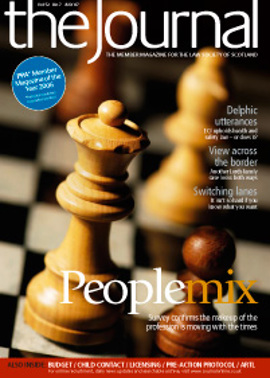Old, new, borrowed and blue

With 11 bounds, he is finally free! By the time this is published, Mr Brown will have been Prime Minister for nearly a month, having left his beloved Treasury behind. His 11th and last Budget was not among his most radical; nor did it lead to yet another absolutely vast Finance Act. (A mere 300 pages pales into insignificance compared to previous briefcase-busters.) But as will be seen in what follows, a slightly reduced page total conceals a substantial number of changes.
But this year’s Budget included the usual examples of things that we have all come to know, if not to love – extreme detail, micromanagement, anti-avoidance, announcements for the relatively distant future and reversing previous changes. As he prepared for his marriage with ultimate power, Mr Brown left us with the traditional wedding accoutrements.
Something old – as well as developments from previous themes (such as the employment/self-employment divide), there were changes that returned us to positions in which we have been before. Something new – there is always something new in a Budget and the changes to capital allowances announced this year form a particularly good example. Something borrowed – Mr Brown is willing to borrow from wherever he finds what he considers good ideas (as well as borrowing new government ministers, if only they will agree). Other parties might claim credit for the environmental tax changes, for example. And something blue – there was much in the Budget that the Conservatives could apparently cheer, no doubt through gritted teeth, including that ultimate borrowing from the blue side, the forthcoming cut in the basic rate of income tax to 20%.
There was much in the Budget about the spending of the money to be raised – another factor which has grown under Mr Brown, with many actual tax measures announced (always with the possibility of revision) in the Pre-Budget Report towards the end of the calendar year. It will be interesting to see whether the next Scottish Chancellor continues with the structural form of his predecessor’s announcements – and whether a new Chancellor might come to demand quite as much tinkering with the system.
It is however fair to say that there was nothing in this year’s changes quite as devastating for mainstream solicitors’ practice as last year’s changes to inheritance tax on trusts. While we continue to absorb the effects of those in their long transitional period, there is enough completely fresh material to keep both tax lawyers and those who need to know just enough tax for their main areas of practice busy for another year.
The basics (and a bit beyond)
Rates and allowances for income tax, capital gains tax, inheritance tax, corporation tax and national insurance are set out in the table on the next page.
Income tax
The biggest change was kept until the end of Mr Brown’s Budget speech, when he announced a reduction in the basic rate of income tax from 22% to 20%. Typically, however, this was not for immediate implementation, but is delayed until 2008-09. There are a number of minor stings in the tail. The 10% starting rate for income tax will from the same year only apply to savings income and capital gains – and as such items are treated as the top part of, or above, other income, it will only be available in a very limited number of cases, for which complications will be increased – a common complaint. The effect of the reduction in basic rate is also to increase the differential between the basic and higher rate, increasing the premium on keeping within the basic rate band by (for example) increasing tax-free income where possible. And charities have already drawn attention to the reduction in the amount of tax which they will be able to reclaim.
There were also announcements of further changes to come in relation to age allowances. They are to outstrip inflation (one hopes), with the age 75+ allowance anticipated to reach £10,000 by 2011-12.
A number of things remain unchanged, such as the rates applicable to discretionary and accumulation trusts (along with their limited basic rate band of £1,000).
The increases in the annual and total pension scheme allowances were announced in advance for a number of years.
Capital gains tax
The annual exempt amount increases only with inflation, both for individuals and for trusts (with a reminder that the latter is shared among all trusts established by the same settlor). Although there were some limited anti-avoidance changes, notably in relation to the use of artificially created losses, there were no fundamental changes to this most complex of taxes.
Inheritance tax
The increases in the inheritance tax threshold have been announced for a number of years ahead. The band will increase to £312,000 for 2008-09, £325,000 for 2009-10, with the sequence extended to £350,000 for 2010-11. While these increases outstrip inflation, it is likely that increasing numbers of estates will become liable to inheritance tax. However, the size of the nil rate band is such that a cycle of lifetime transfers over seven year periods can transfer very large amounts of assets. While trusts have been made a little less attractive by changes in 2006, nil rate band trusts remain very attractive estate planning tools.
Corporation tax
Recent extensive changes to corporation tax may be set to continue. The abolition of the zero-rate band last year has been followed by an increase in the small companies rate from 19% to 20% from 1 April 2007, to be followed by further rises bringing it to 22% by 2009. In contrast, the main rate will from 1 April 2008 decrease to 28%. The differential between the two rates becomes almost marginal.
National insurance
There are further moves afoot to align further thresholds for national insurance, so that eventually the upper earnings limit will equate to the point at which higher rate income tax bites. The trend of an increased national insurance contribution to the overall tax burden continues, with the upper limits for the main rates of class 1 and class 4 contributions increasing well above the rate of inflation.
Savings and investment
Once more, the change of perhaps the widest effect among the general population is delayed. From 1 April 2008 (although legislation has already been published) the limits for Individual Savings Accounts are increased, but only marginally. It will become possible to pay £3,200 each year into a cash ISA, or up to £7,200 into a mixed or stocks and shares ISA. The opportunity is taken to tidy up a number of hangovers from previous regimes for tax-privileged savings, such as PEPS and TESSAs.
Further changes are made to the various regimes which are designed to encourage investment in small companies – the Enterprise Investment Scheme, venture capital trusts and the Corporate Venturing Scheme. The financial limits on the size of eligible companies have been driven downwards in recent years. This type of process continues, with prevention of further fundraising for at least a year, if more than £2 million has been raised; and a further restriction to 50 employees of the company for which the fundraising is to take place.
There is a change in the rules affecting dividends paid by overseas companies, making the tax payable by UK individual and trust investors in most cases similar to the tax they would pay on dividends from UK companies.
As regards pensions, there is nothing to compare to the veritable revolution which occurred on pension A-day, 6 April 2006. There are some minor changes, which include exemption from a number of benefits in kind provided to former employees. Of particular interest to solicitors seeking business may be the exemption of benefits provided relating to the drafting of wills.
Pension relief is no longer to be available in relation to the payment of premiums on personal term assurance policies.
In relation to life assurance more generally, an anti-avoidance rule is introduced restricting the deduction of commission when calculating the taxable profit on certain chargeable event gains.
There are various technical changes made to the rules on offshore collective investment funds.
Inheritance tax, pre-owned assets and trusts
An important clarification is made in relation to a relief which many assumed to be complete in any event.
It will be made clear that other than in exceptional circumstances, lump sum death benefits from pension schemes are not taxable. This will be backdated to 6 April 2006.
There is a useful and practical extension of the ability to elect that assets which would otherwise fall within the income tax charge on pre-owned assets should instead be treated as owned by the taxpayer and thus be subject to inheritance tax.
There will be nothing in this year’s Finance Act to compare with recent fundamental changes to the taxation of trusts. A few minor corrections and extensions are made to the new income tax rules. Private landlords can establish “sinking fund” trusts for repairs to buildings, without becoming liable to the 40% rate on discretionary trusts. If a trust sells to a company that company’s own shares, provision is made to ensure that only the excess over the original subscription price is taxable as a dividend (as is the case for individual sellers of shares in those circumstances). A 20% notional tax credit from chargeable gains on life policies will no longer be available to trustees.
Charities
There is an increase in the benefits that donors to charities can receive in return while remaining entitled to gift aid tax relief. The “returned benefit” can now be up to 5% of the amount donated, with an absolute annual limit of £500.
Alan R Barr, Brodies LLP/The University of Edinburgh
[The second and final part of this commentary will be published next month]
(Please see printed version or PDF download of the Journal for table.)
In this issue
- The power of marks: Frankie goes after Hollys name
- Confidentiality clauses - beware!
- Into the fast lane
- All change please...!
- Benchmark for practice
- Old, new, borrowed and blue
- Old, new, borrowed and blue (1)
- The Oracle has spoken
- High road, low road
- Point of contact
- Stuck in a rut?
- Counsel's fees - a reply
- Fraud: no hiding place
- A chance to shine
- CDD is the new ID
- System integrity
- Professional negligence: Pre-Action Protocol
- Not just a fancy name
- More on "enough is enough"
- Are you up to the Act?
- Saving energy - and effort
- Takeover goals
- Expensive consequences
- Expensive consequences (1)
- Scottish Solicitors' Discipline Tribunal
- Website reviews
- Book reviews
- Time (to prepare) please!
- ARTL - now and then?






